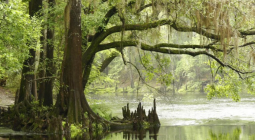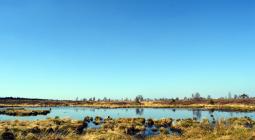“Saving Africa’s wetlands: a crucial battle for biodiversity”
Faced with the rapid loss of biodiversity in Africa, the protection of wetlands is emerging as a key priority. Musonda Mumba, Secretary General of the Convention on Wetlands, calls for international and local collaboration to preserve these vital ecosystems. From the Gambia to Mozambique, inspiring initiatives are showing the way towards sustainable and participatory management, which is vital for the ecological future of the continent.
Africa’s biodiversity, essential to the continent’s economy and climate resilience, is in serious decline. According to Musonda Mumba, Secretary General of the Convention on Wetlands, the loss of biodiversity in Africa could accelerate under the impact of climate change, with alarming projections indicating that more than half of African bird and mammal species could disappear by the end of the century. This loss also threatens the productivity of lakes and the diversity of plant species.
In an article published on 21 May 2024 on the United Nations (UN) website, the wetlands expert explains the role of these ecosystems in preserving biodiversity. They are home to a wide range of flora and fauna, provide fresh water and food, create jobs and protect local communities from floods and storms. However, these ecosystems are being destroyed at an alarming rate.
Conservation efforts at different levels
Many African countries have taken steps to counter this crisis by developing national biodiversity strategies and action plans. These efforts are aimed at achieving the goals of the Kunming-Montreal Global Biodiversity Framework. Although overall progress is difficult to measure, notable successes have been achieved in restoring threatened species and managing protected wetlands.
International initiatives such as the Ramsar Convention on Wetlands play a key role. For example, cross-border collaboration between Gambia and Senegal has led to the protection of the Niumi-Saloum Ramsar site, which is crucial for regional biodiversity. In Gabon, World Bank-funded projects have strengthened conservation in parks and forested wetlands, reducing illegal activities such as fishing and poaching.
In South Africa, a grant from the Global Environment Facility (GEF) has improved management of the iSimangaliso wetland, creating jobs and training local leaders in effective resource management. Mozambique, through the MozBio programme, has protected various habitats, including coral reefs and national parks, mobilising thousands of local participants in conservation.
The role of local communities
Local communities are key players in the preservation of wetlands. In Angola, the ecologist Fernanda Samuel, through her work with the non-governmental organisation (NGO) Otchiva, has inspired a generation of young people to get involved in conservation. In Uganda, the initiatives of two local women in the Achwa river basin demonstrate the importance of community-based resource management. In Madagascar, the community led by Justin Rakotomanahira has transformed 56 hectares of arid land into a haven of biodiversity, demonstrating the power of local action.
Protecting wetlands is essential to halting the loss of biodiversity in Africa. Efforts must be concerted, involving governments, NGOs, international institutions and above all local communities. Local initiatives, supported by international frameworks such as the Convention on Wetlands, show that collaboration at all levels can reverse destructive trends and preserve the continent’s natural heritage.
Musonda Mumba, with more than 25 years’ experience in environmental management, stresses the need for adaptive governance and the promotion of local knowledge. She believes that close collaboration between local experts, government authorities and international organisations is crucial to the sustainable management and protection of wetlands.
Cover photo: By Boris Ngounou





